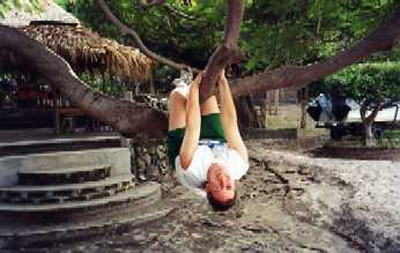News & Events
Westminster Biology Student Spent Summer "Monkeying Around"
Posted on Monday, September 1, 2003
Devayani Wintrode, a senior neuroscience major at Westminster College, spent her summer studying primates at the Ometepe Biological Field Station in Nicaragua.
"I saw this flyer on the Westminster biology bulletin board," Wintrode said. "I contacted them, sent in the information packet they wanted, and was accepted."
"We flew into Mangua and stayed in a hotel the first night, and in the morning took a three-hour van ride, followed by an hour boat ride to an island in the middle of Lake Nicaragua," Wintrode continued. "My days started at 4:30 a.m. with a three-mile hike into the Rain Forest. I learned how to do the basic techniques of learning behavior of animals, like how to recognize each individual primate and how to record behaviors. Then I was assigned an individual research project on the Howler Monkey, which many say is the loudest animal in the world.
"My research focused on the communication and vocalization of one particular male. I'd watch him for an hour and record what was going on around him that caused him to howl, and what the responses were in his group of monkeys and of other groups nearby. This was challenging because he would take off and I would have to run after him without getting knocked down by some branches. He definitely had the advantage. Even though these monkeys were used to people studying them, they never let you get too close. They would bark at you if you startled them. It was a noise that started out like a growl and then grew into a loud bark. They made a cooing noise between their own group, however."
Wintrode's day was not over at dinner.
"After dinner of mostly rice and beans, textbook classes were conducted," Wintrode said. "There were no computers, so all the research, including the final paper was done in long hand.
"I stayed in a cabin with one other person and geckos that chirped at night. It was a nice place, but the showers only had cold water that was full of bugs. I still took at least two showers a day because it was so hot. I had to wear long pants though, even with the heat, because of the bugs and the native culture."
When not studying or hiking in the Rain Forest, Wintrode did some sightseeing.
"There were two volcanoes on this island, and one of them was active," Wintrode said. "There were also beautiful waterfalls.
"The class went kayaking to another nearby island, and saw Spider Monkeys and Capuchin Monkeys also called, organ grinder monkeys. These are rescued pets that were put on this island after their owners were tired of the pranks monkeys played. Humans feed them each day, so they were ready to pose for our photos.
"On the way home the class stopped in the Granada National Park, were we saw the crater of an active volcano. The acid in the air was too dangerous to stay there too long. We also visited a preschool and an orphanage, and this taught us a great deal about the culture. Life is simple there, and family is important to them. Even though they don't have many material things - no television, no radio, no e-mail -- they appreciate what they have. We could all learn from them."
Wintrode is a daughter of Marilyn and Nevin Wintrode, Girard, Pa., and a graduate of Girard High School.
For more information, contact Wintrode at wintrodm@westminster.edu.


More Stories



